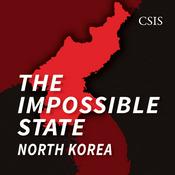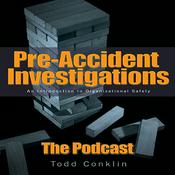2823 odcinków
- Andy Grotto, William J. Perry International Security Fellow and the founder and co-director of the Program on Geopolitics, Technology, and Governance at Stanford University’s Center for International Security and Cooperation (CISAC), and Jim Dempsey, a senior policy adviser to that program and a Lecturer at the UC Berkeley Law School, join Lawfare’s Justin Sherman to discuss their recent study on the U.S. military’s domestic operational technology (OT) cybersecurity vulnerabilities, domestic installations’ dependencies on critical infrastructure both “inside the fence” and “outside the fence,” and how U.S. adversaries could exploit the flaws. They also discuss the myth of the air gap; the Pentagon's Energy Resilience Program; the role that standards, regulations, and procurement could play in strengthening the cybersecurity of OT systems on which the military depends; and what the threat landscape will look like in the coming years.
Resources:
James X. Dempsey and Andrew J. Grotto, “Ensuring the Cyber Resilience of Critical Infrastructure Serving Domestic Military Installations: Questions for Senior Leadership,” The Cyber Defense Review 10, no. 2 (2025): 115-138
Jim Dempsey and Andrew J. Grotto, “The Pentagon’s Operational Technology Problem,” Lawfare, December 15, 2025
To receive ad-free podcasts, become a Lawfare Material Supporter at www.patreon.com/lawfare. You can also support Lawfare by making a one-time donation at https://givebutter.com/lawfare-institute.
Support this show http://supporter.acast.com/lawfare.
Hosted on Acast. See acast.com/privacy for more information. - In a live conversation on YouTube, Lawfare Editor in Chief Benjamin Wittes sat down with Lawfare Senior Editors Anna Bower, Roger Parloff, and Eric Columbus and Lawfare Associate Editor Olivia Manes to discuss discussed the FBI searching the home of a Washington Post reporter, the Supreme Court oral arguments in President Trump’s attempt to fire Lisa Cook from the Federal Reserve, the criminal inquiries into Minnesota state officials and protestors, and more.
You can find information on legal challenges to Trump administration actions here. And check out Lawfare’s new homepage on the litigation, new Bluesky account, and new WITOAD merch.
To receive ad-free podcasts, become a Lawfare Material Supporter at www.patreon.com/lawfare. You can also support Lawfare by making a one-time donation at https://givebutter.com/lawfare-institute.
Support this show http://supporter.acast.com/lawfare.
Hosted on Acast. See acast.com/privacy for more information. Lawfare Archive: Joel Braunold on What Donald Trump's Return Might Mean for the Israeli-Palestinian Conflict
25.01.2026 | 1 godz. 3 min.From December 6, 2024: For today’s podcast, Lawfare General Counsel and Senior Editor Scott R. Anderson sat down with Joel Braunold, Managing Director of the S. Daniel Abraham Center for Middle East Peace, for the latest in their series of podcast conversations on aspects of the Israeli-Palestinian conflict. This time, they focused on what might be one of the most consequential developments in recent memory: Donald Trump’s return to the White House.
They discussed who seems likely to steer policy toward the conflict in the incoming Trump administration, how the approach may differ from Trump’s last stint in the White House, and what it all may mean for Gaza, the West Bank, and the broader region.
To receive ad-free podcasts, become a Lawfare Material Supporter at www.patreon.com/lawfare. You can also support Lawfare by making a one-time donation at https://givebutter.com/lawfare-institute.
Support this show http://supporter.acast.com/lawfare.
Hosted on Acast. See acast.com/privacy for more information.- From January 15, 2025: In a live conversation on January 14, Lawfare Editor-in-Chief Benjamin Wittes spoke to Lawfare Senior Editor Anna Bower about the confirmation hearing of Pete Hegseth by the Senate Armed Services Committee on his expected nomination to be secretary of defense, the first confirmation hearing for one of President-elect Trump’s cabinet nominations in his second term.
To receive ad-free podcasts, become a Lawfare Material Supporter at www.patreon.com/lawfare. You can also support Lawfare by making a one-time donation at https://givebutter.com/lawfare-institute.
Support this show http://supporter.acast.com/lawfare.
Hosted on Acast. See acast.com/privacy for more information. - Jakub Kraus, a Tarbell Fellow at Lawfare, speaks with Alan Rozenshtein, Associate Professor of Law at the University of Minnesota and Research Director at Lawfare, and Kevin Frazier, the AI Innovation and Law Fellow at the University of Texas School of Law, a Senior Fellow at the Abundance Institute, and a Senior Editor at Lawfare, about Anthropic's newly released "constitution" for its AI model, Claude.
The conversation covers the lengthy document's principles and underlying philosophical views, what these reveal about Anthropic's approach to AI development, how market forces are shaping the AI industry, and the weighty question of whether an AI model might ever be a conscious or morally relevant being.
Mentioned in this episode:
Kevin Frazier, "Interpreting Claude's Constitution," Lawfare
Alan Rozenshtein, "The Moral Education of an Alien Mind," Lawfare
Find Scaling Laws on the Lawfare website, and subscribe to never miss an episode.
To receive ad-free podcasts, become a Lawfare Material Supporter at www.patreon.com/lawfare. You can also support Lawfare by making a one-time donation at https://givebutter.com/lawfare-institute.
Support this show http://supporter.acast.com/lawfare.
Hosted on Acast. See acast.com/privacy for more information.
Więcej Rządowe podcastów
Trendy w podcaście Rządowe
O The Lawfare Podcast
The Lawfare Podcast features discussions with experts, policymakers, and opinion leaders at the nexus of national security, law, and policy. On issues from foreign policy, homeland security, intelligence, and cybersecurity to governance and law, we have doubled down on seriousness at a time when others are running away from it. Visit us at www.lawfaremedia.org.Support this show http://supporter.acast.com/lawfare. Hosted on Acast. See acast.com/privacy for more information.
Strona internetowa podcastuSłuchaj The Lawfare Podcast, No es el fin del mundo i wielu innych podcastów z całego świata dzięki aplikacji radio.pl

Uzyskaj bezpłatną aplikację radio.pl
- Stacje i podcasty do zakładek
- Strumieniuj przez Wi-Fi lub Bluetooth
- Obsługuje Carplay & Android Auto
- Jeszcze więcej funkcjonalności
Uzyskaj bezpłatną aplikację radio.pl
- Stacje i podcasty do zakładek
- Strumieniuj przez Wi-Fi lub Bluetooth
- Obsługuje Carplay & Android Auto
- Jeszcze więcej funkcjonalności


The Lawfare Podcast
Zeskanuj kod,
pobierz aplikację,
zacznij słuchać.
pobierz aplikację,
zacznij słuchać.





















